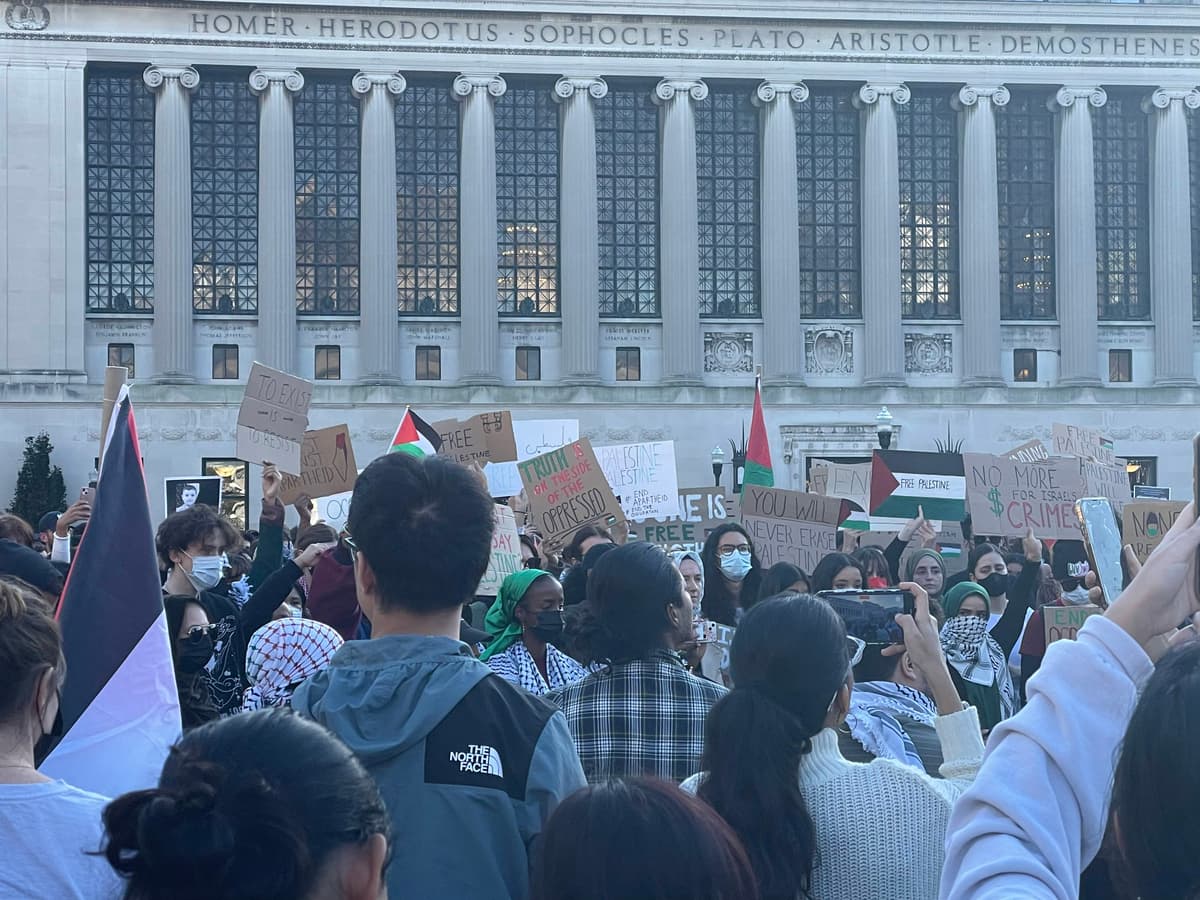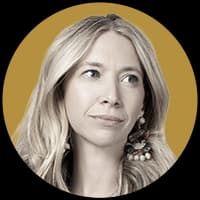Columbia Unbecoming, the Sequel: How One Undergraduate Discovered the Truth About Her University, Then and Now
It started one bright day 20 years ago, when classmates began screaming at her because she was a Zionist.

Twenty years ago, I was a student on Columbia University’s campus. Idealistic. Passionate. Tenacious. Socially liberal. Naive. Like most students, I was determined to stand up for the underdog and fight for the oppressed.
It was 2003 and I, along with a few other students involved with pro-Israel advocacy, was recruiting on college walk, as was typical for student groups at the start of the year. A group of anti-Israel protesters came up close to us and began screaming: “Zionists are occupiers,” “Free Palestine,” and “End apartheid now.”
Many of them were not actually Columbia students. We didn’t know from where they came, only that they were vilifying Israel and bastardizing the facts of history, complete with antisemitic cartoons. They were not interested in healthy debate or in peaceful conversation. They were there to sow the seeds of propaganda.
They were not alone. There were professors in the Middle East Asian Language and Cultures Department who would become the subjects of a documentary called “Columbia Unbecoming,” which I along with some other students created to tell the stories of Jewish students who had experienced bias, intimidation, and even grade manipulation in the classroom simply for not towing the line politically with their professors.
These professors were teaching that Israel was committing genocide, denying Hamas’s use of civilians as human shields, and creating a narrative in which Israel was a racist apartheid state. In an attempt to communicate these grievances, I and three other students — Bari Weiss, Ariel Beery, and Aharon Horwitz — formed a group called Columbians for Academic Freedom. It was to stand up for these students and any students who were feeling silenced in the classroom due to their political views.
We screened the documentary for members of the administration later that Spring and these officials said … nothing. The instances of bias and intimidation were linked to three professors: Hamid Dabashi, George Saliba, and Joseph Massad. The latter was the only one who was not yet tenured. These professors called the film a witch-hunt, asserting that we were trying to squash their academic freedom.
When the university finally did respond to the allegations of grievances, after much external pressure from donors, the press, and political leaders in New York, Columbia convened a sham ad-hoc committee to hear student grievances that ultimately found “no evidence of any statements made by the faculty that could reasonably be construed as anti-Semitic.” They also found “no basis for believing that Professor Massad systematically suppressed dissenting views in his classroom.”
The administration asked all three professors to go on a temporary leave so as to allow the storm to pass. A few years later, in 2009, Mr. Massad was awarded tenure. Now, almost 15 years later, those seeds of propaganda, both student group and professor driven, and administration sanctioned, have blossomed into the current crisis.
Social media algorithms, trolling, and unmoderated extremism, coupled with decades of a pervasive false narrative seeping from the classrooms and into the halls of our universities, the success of the BDS movement, and the alignment of intersectionality and Black Lives Matter with the Palestinian cause has set the world ablaze with its antisemitic undertones and overtones.
Last Wednesday, an Israeli General Studies student was attacked by a woman named Malaika Friedman, for hanging posters of the Hamas captives. When I asked an unaffiliated student what had happened, she told me the press had drastically overplayed it and that “it was just a papercut.” Ms. Friedman has been charged with a hate crime and second- and third-degree assault.
The next day, more than a thousand people gathered at a pro-Hamas rally calling for Jewish genocide and an end to the state of Israel, screaming, “From the River to the Sea Palestine Will Be Free.” Jewish stars have been found painted on dormitories of Jews. Jewish students were forced to go on lockdown in the Hillel building, with police protection due to fear for their safety.
Jackson Gregory, Columbia Law School ’25, shared with me a Joint Statement for Palestinian Solidarity written and signed on to by more than 20 student organizations at Columbia Law School and sent out on October 9, while Hamas was still butchering civilians inside of Israel.
At the time, the death toll was yet to be determined, and burned and tortured bodies were still being found, while rockets from Gaza rained down heavily across Israel and while much of the world sat shell-shocked and traumatized from witnessing the level of inhumane, person-to-person sadistic violence that would forever mark October 7 as Black Sabbath.
Although he is not Jewish, Mr. Gregory attended the pro-Israel rally Thursday. “Because of the deep sorrow and alienation felt by my Jewish friends, I was in equal parts impassioned to voice my support after Saturday’s atrocities and ashamed, and frankly disgusted, by the statements put forth from opposing student groups on campus.”
Mr. Gregory continued, “The ease with which they, the over 20 organizations at Columbia Law School who signed in support of a Joint Statement for Palestinian Solidarity, could find the butchering of civilians an act of “resistance” and mark innocent Israelis as in any way responsible for their own slaughter was shameful. And, perhaps more astounding, the reluctance of these groups to divorce their cries for the welfare of Palestinian civilians, which all should surely heed, from Hamas’ blatant terrorism seems myopic at best and brutally antisemitic at worst. “
On this subject, Mr. Massad published an article on October 8, one day after the massacre, in the Electronic Intifada. “The sight of the Palestinian Arab resistance fighters storming Israeli checkpoints separating Gaza from Israel,” he writes, “was astounding, not only to the Israelis but especially to the Palestinian and Arab peoples who came out across the region to march in support of the Palestinians in their battle against their cruel colonizers. …”
“No less awesome were the scenes witnessed by millions of jubilant Arabs who spent the day watching the news, of Palestinian fighters from Gaza breaking through Israel’s prison fence or gliding over it by air,” Mr. Massad writes.
Many students and alumni were outraged by this lack of empathy that a tenured professor at Columbia University could display to the public. Within hours of reading the article on October 13, a junior at Columbia who had been student body president the year before and was no stranger to activism, Maya Platnick, leaped into action.
“I was completely shocked by what Professor Masad was saying, using words like ‘stunning victory,’ and ‘ jubilation,’ and ‘awesome,’ to describe what was the most horrific massacre on humanity, brutally killing 1300 people, injuring 3,400, raping women, beheading and burning babies, and torturing and abducting hundreds including Holocaust survivors.”
She created on Change.org a petition for the “Immediate Removal of Joseph Massad from Columbia’s Faculty.” In less than four days the petition had garnered nearly 52,000 signatures. Ms. Platnick was encouraged by its support. And then, she started getting messages, hundreds of messages, that it wasn’t working.
Sure enough, she discovered yesterday that the petition had been taken down and was “under review.” At the time of this article, she hasn’t heard from customer service as to why, but she assumes that someone, or many people, complained about it.
Twenty years ago, when I was a student, we felt we had to tiptoe around the alignment of antisemitism with anti-Zionism for fear of conflating matters in people’s eyes. The truth of the matter, as we see all too clearly today, is there never was a difference.
Last night, a vigil was held on Columbia’s campus by a few students and professors, where they discovered the iconic Alma Mater statue, a symbol of “the nourishing mother” fostering growth through education, adorned in a checkered keffiyeh.
On seeing this, a Columbia College and Columbia Law School graduate, Akiva Shapiro, wrote on Linkedin, “The same keffiyeh worn by many of the rampaging terrorists who gleefully slaughtered and raped and tortured and brutalized and took hostage 1,300 or more Israelis — mostly babies and grandparents and peace loving youngests at a music festival just days ago. …
“Columbia, I ask you: would you allow a march on the Jewish student center by a white-hooded mob? Would you sanction Alma Mater dressed up in her Grand Wizard finest?”
A few dozen individuals convened for this vigil, attempting to come together to dispel a bit of darkness, as they lit candles, placing them into the formation of a large Magen David.
An Israeli Columbia Business School professor, Shai Davidai, asked everyone to take out their phones to film what he was about to say. He proceeded to give a heartfelt plea to parents across the country.
“I want this message to get to every parent who sent their kids to Columbia University and trusted their kids and their children’s safety with us. I want this message to get to every parent in America who sent their kids to NYU, to Harvard, to Stanford, to Berkley … I want you to know one thing. We cannot protect your child.”
Addressing Columbia University’s president, Minouche Shafik, Mr. Davidai said, “We are waiting for you to eradicate all pro-terror student organizations from campus. Last week we had thousands of students chanting pro-terror songs that are sung right now in Iraq, in Libya, in Afghanistan. They were singing these here in NYC. … They were celebrating the rape of teenage girls in a music festival in the name of resistance. They were celebrating this.”
He relayed how many people have asked him in the last few days if he is afraid to speak up because it would be putting his job on the line, to which he replied, “People have got it all wrong. I am not afraid to speak up. I am speaking up because I am afraid.”
________
Correction: Mr. Gregory’s statement has been corrected for inaccuracies introduced during editing for the bulldog.

